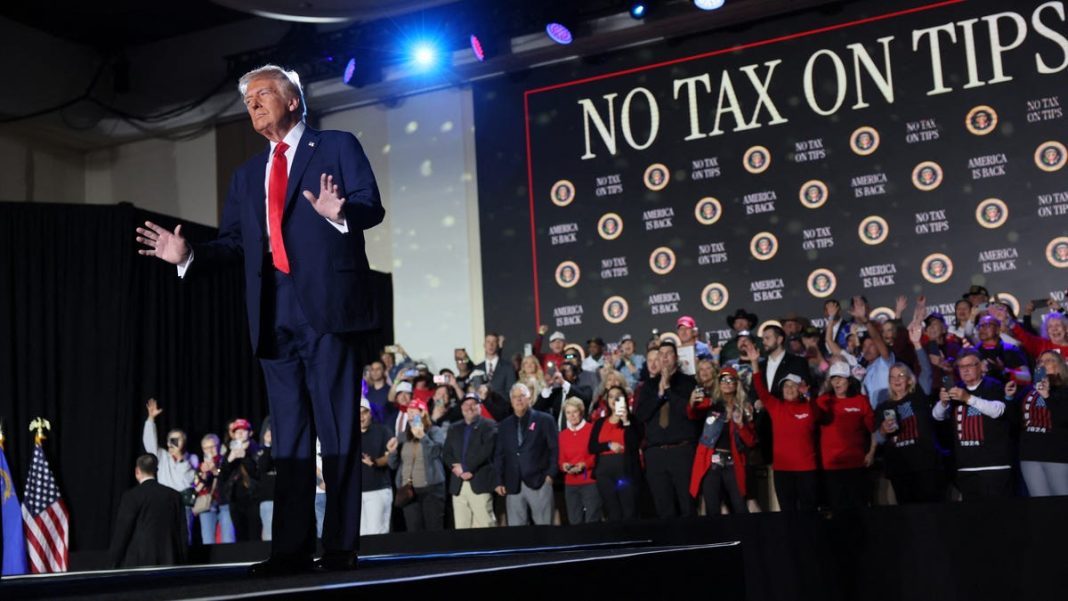Americans are growing weary of tipping. Experts warn that eliminating taxes on tips might worsen the situation.
In late January, President Donald Trump reaffirmed his commitment to removing taxes on tips during a rally in Nevada, a promise he first made while campaigning in the state.
While addressing supporters at the Circa resort and casino in downtown Las Vegas, Trump stated he would collaborate with Congress in the following weeks to push through a legislative bill.
“If you work in a restaurant, as a server, valet, bellhop, bartender, or any profession relying on tips your tips will be entirely yours,” Trump declared.
The idea of eliminating taxes on tips has garnered support from industry groups, the largest labor union in the state, and politicians from both major parties. However, many economists and policy analysts are skeptical, viewing the proposal as unfair, expensive, and ultimately ineffective for most low-income Americans.
“No taxes on tips might have been a savvy political move during the campaign, but it’s far from sound tax policy,” remarked Kyle Pomerleau from the American Enterprise Institute, a center-right think tank.
Is it fair to tax tips?
Trump first suggested exempting tips from taxes during his campaign, inspired by a waitress at his Las Vegas hotel. This resonated strongly in Nevada, which has the highest number of tipped workers in the U.S., leading Trump to become the first Republican to win the state since 2004.
Support for this concept spans workers’ advocates and business leaders alike.
At the rally, Rosanna Maietta, the president and CEO of the American Hotel and Lodging Association, advocated for Congress to approve the measure so that hotel staff can “retain more of their hard-earned wages.”
A significant portion of the general public backs this initiative: an August Ipsos survey revealed that 73% of Republicans, 75% of Democrats, and 73% of independents approved.
However, implementing no taxes on tips could lead to complications, according to Pomerleau, a senior fellow at the American Enterprise Institute.
A small fraction of low-income Americans would see advantages from this policy. About 4 million individuals, or about 2.5% of workers in the U.S., received tips in 2023, based on research from Yale University’s Budget Lab, which examines federal economic policy proposals. More than a third of these individuals didn’t earn enough to be liable for federal income taxes last year.
The estimated average tax benefit for families potentially affected stands at roughly $1,700, while those in the lowest income bracket would save around $200.
On the other hand, such a policy could worsen the federal budget deficit, with estimates predicting a revenue dip exceeding $100 billion over the next decade. The extent of lost revenue could vary, depending on whether it also shields payroll taxes alongside federal income taxes. Restricting the tax exemption to specific jobs or industries might also help minimize costs.
“Although this policy is not massive, over a decade, the estimated loss of $100 billion is still a significant amount of money,” said Alex Muresianu, a senior policy analyst at the Tax Foundation, a center-right tax policy think tank. “It represents a big change for a relatively small group of workers.”
Pomerleau noted that this policy could create disparities among non-tipped employees: If a cook and a waiter earn the same salary at the same restaurant, why should the waiter enjoy a higher income after taxes?
There are also worries that this policy shift could encourage employers and employees to rely more on tipping, potentially worsening the prevalent tipping fatigue experienced nationwide post-pandemic. A 2023 Pew report indicated that nearly 75% of Americans feel tipping is expected more frequently now than it was five years ago.
“We might witness an increase in mandatory or expected tips, especially in dining establishments, as businesses shift more of the overall price to appear as a tip,” mentioned Joseph Rosenberg, a senior fellow at the left-leaning Urban-Brookings Tax Policy Center.
Legislation to eliminate taxes on tips
To actualize this proposal, congressional action would likely be necessary. Several lawmakers have introduced bills to eliminate taxes on tips, including the No Tax on Tips Act, jointly sponsored by Nevada Democrats Senators Jacky Rosen and Cortez Masto.
“This bipartisan initiative will ensure that tipped workers in Nevada retain a larger portion of their earnings,” Sen. Rosen stated in a January press release. She highlighted that service and hospitality jobs, which represent about 20% of employment in the state, are pivotal to the economy.
The Culinary Union, representing around 60,000 hospitality employees in Nevada, backs the measure but has also called for the abolition of the $2.13 federal minimum wage for tipped workers.
“Addressing both issues is essential to ensure that one job can sufficiently support workers and their families,” said union secretary-treasurer Ted Pappageorge in a January statement.
The proposed legislation would exclusively benefit “traditionally tipped” workers and exempt tips solely from federal income taxes, leaving other payroll taxes that contribute to Medicare and Social Security intact.
While these limitations could lower the budget impact, “I don’t believe there is a version of this policy that would, overall, enhance the tax system,” noted Muresianu from the Tax Foundation. “However, some iterations could minimize problems or be less detrimental.”

